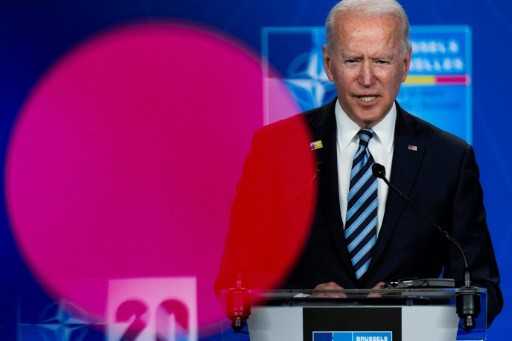Biden promises to lay out 'red lines' to Putin; NATO addresses China challenge
15 June, 2021

U.S. President Joe Biden said Monday he would lay down "red lines" to his Russian counterpart Vladimir Putin at their upcoming meeting, after rallying NATO allies to handle up to challenges from Moscow and Beijing.
Speaking after his first NATO summit since being elected, Biden insisted: "I'm not looking for conflict with Russia, but that people will respond if Russia continues its harmful activities."
Biden also called Putin "tough" and "a worthy adversary" before their hotly anticipated meeting in Geneva on Wednesday.
The warning to the Kremlin leader came as Biden pressed to renew Washington's transatlantic ties with allies after years of tensions under his predecessor Donald Trump.
At Biden's urging, NATO leaders agreed to interact against the "systemic challenges" posed by China's aggressive policies as the alliance fleshed out its nascent method of Beijing.
China's increasingly assertive actions in building a nuclear arsenal in addition to space and cyber warfare capacities threatens the international order, they said in a statement.
NATO Secretary General Jens Stoltenberg said the allies would seek to cooperate with China on global issues like climate change, as European capitals wanted.
But, in a nod to Washington's growing concern, he warned: "China's growing influence and international policies present challenges to Alliance security."
"Leaders agreed that people have to address such challenges together as an alliance, and that we must engage with China to guard our security interests," he said.
In the summit communique, the leaders told Russia that there will be no quick go back to "business as usual".
Russia's military build-up and provocative behavior on NATO's eastern frontier "increasingly threaten the security of the Euro-Atlantic area and donate to instability along NATO borders and beyond".
On China, Biden is picking right up from where Trump left off by getting NATO to begin watching Beijing.
But European allies have already been wary an increase of focus on China could distract NATO from its major priority -- Russia.
German Chancellor Angela Merkel insisted that alliance members should not "overestimate" the dangers posed from Beijing.
"We have to find the appropriate balance," she said. "China is a rival on many issues, but concurrently it is also somebody on many issues."
French President Emmanuel Macron insisted that NATO should not spread itself too thin and "skew" the relationship with China.
"NATO is a military organization, the subject of our relationship with China isn't just military," he said, stressing NATO's north Atlantic focus.
Looming large in the backdrop for the summit was also the scramble to complete NATO's hasty withdrawal from Afghanistan after Biden surprised partners by ordering U.S. troops home by September 11.
A lot of the summit Monday was focused on trying to forge a way forward by greenlighting a 2030 reform plan to revitalize an alliance that Macron warned in 2019 was undergoing "brain death".
Allies endorsed a fresh cyber defense policy to tackle rising threats and agreed for the first time an attack in space could trigger the Article 5 collective defense clause.
They also committed to increasing the alliance's budget and spending more on "common funding" -- but details remained sparse after opposition to increased spending led by France.
Source: japantoday.com
